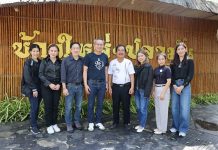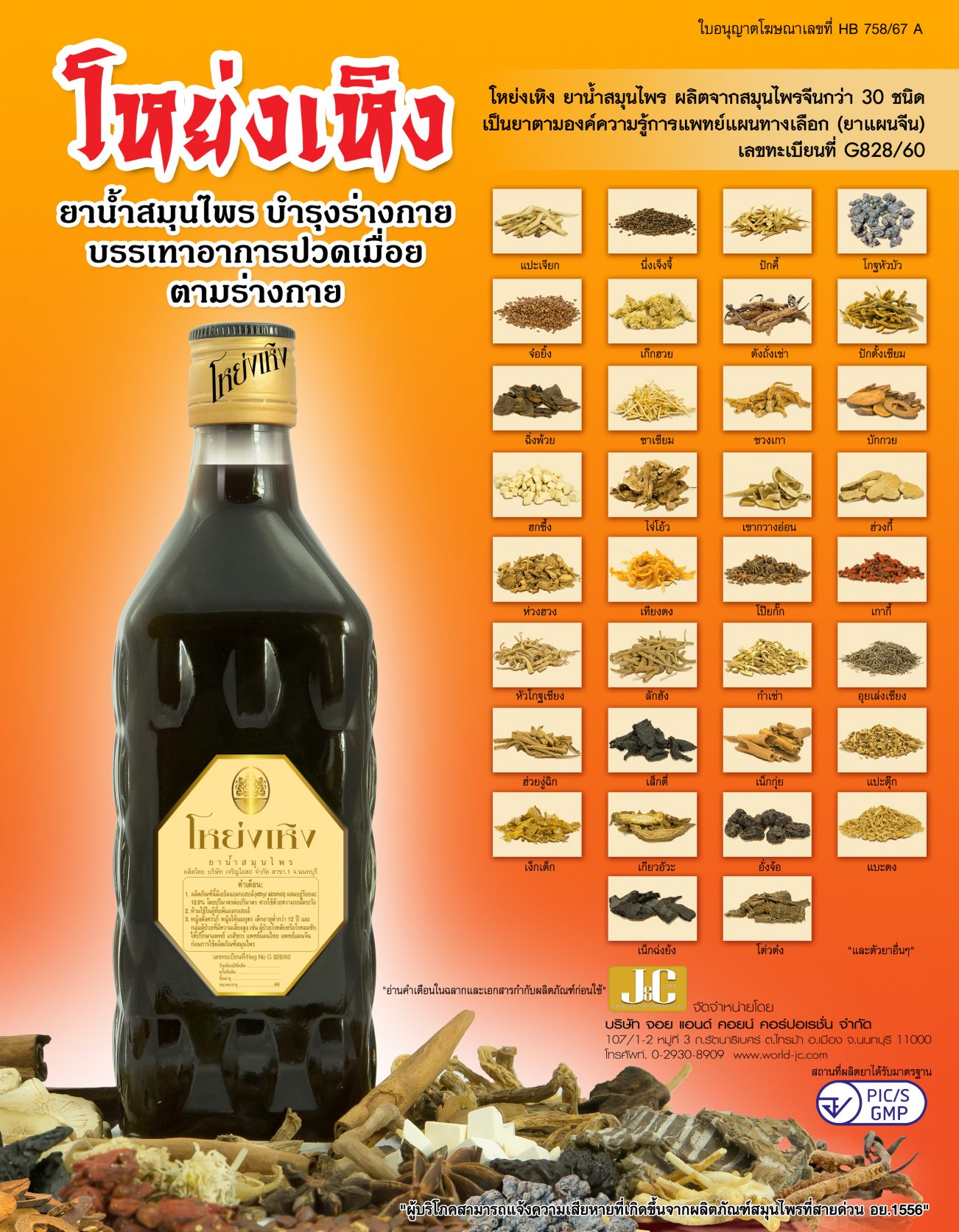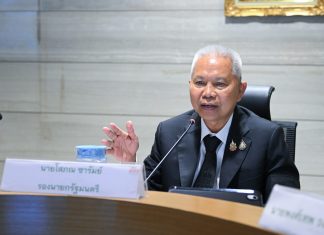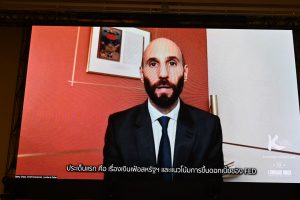
KBank Private Banking ร่วมกับ Lombard Odier พันธมิตรทางธุรกิจ ไพรเวทแบงก์ระดับโลกจากสวิตเซอร์แลนด์ และ ศูนย์วิจัยกสิกรไทย คาดการณ์เศรษฐกิจโลกในปี 2566 ชะลอตัวเข้าสู่ภาวะถดถอยจากจากนโยบายการเงินที่เข้มงวดของธนาคารกลางสหรัฐฯ ในขณะที่จีนยังคงนโยบายโควิดเป็นศูนย์ และส่งสัญญาณเปิดประเทศอย่างค่อยเป็นค่อยไป ด้านยุโรปที่ยังคงมีวิกฤตราคาพลังงานที่ยังพุ่งขึ้นสูงอย่างต่อเนื่อง ศูนย์วิจัยกสิกรไทยเผยเศรษฐกิจไทยได้รับผลกระทบจากที่เศรษฐกิจหลักของโลกเผชิญภาวะถดถอยเช่นเดียวกัน พร้อมเผยคำแนะนำนักลงทุนให้ลงทุนในสินทรัพย์ที่มีคุณภาพและสภาพคล่องสูง กระจายความเสี่ยงด้วยการลงทุนในสินทรัพย์นอกตลาด และให้ความสำคัญกับการลงทุนยั่งยืน
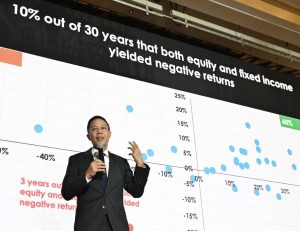
นายจิรวัฒน์ สุภรณ์ไพบูลย์ Executive Chairman, Private Banking Group ธนาคารกสิกรไทย เปิดเผยว่า ตลอดปี 2565 ตลาดลงทุนมีความกังวลต่อเงินเฟ้อสหรัฐฯ ที่พุ่งขึ้นอย่างต่อเนื่อง กดดันให้ธนาคารกลางสหรัฐฯ หรือ เฟด ปรับขึ้นอัตราดอกเบี้ยแบบรุนแรงและรวดเร็วอย่างต่อเนื่อง ในขณะที่สงครามระหว่างรัสเซียและยูเครนลากยาวต่อเนื่องและยังไม่มีท่าทีว่าจะจบลง ราคาพลังงานในยุโรปขยับตัวสูงขึ้นอย่างต่อเนื่องส่งผลให้เงินเฟ้อปรับสูงขึ้น ในขณะเดียวกัน จีนแม้ยังไม่มีความเสี่ยงที่จะเข้าสู่ภาวะถดถอยเหมือนกับประเทศอื่นๆ แต่นโยบายการเปิดประเทศแบบค่อยเป็นค่อยไป และการกระตุ้นเศรษฐกิจผ่านนโยบายการคลังมีแนวโน้มจะช่วยให้เศรษฐกิจจีนเติบโตได้แต่ก็ยังต่ำกว่าเป้าหมายที่วางไว้ KBank Private Banking ในฐานะที่ปรึกษาและผู้เชี่ยวชาญด้านการลงทุนแนะให้ลูกค้ากระจายการลงทุนในสินทรัพย์นอกตลาด ทั้งหุ้นนอกตลาด ตราสารหนี้ และอสังหาริมทรัพย์นอกตลาดเพื่อลดความผันผวนของพอร์ต นอกจากนั้นยังแนะนำลดสัดส่วนของกองทุนรวมหุ้น และถือเงินสดเพิ่มเติมราว 5-15% ของพอร์ต เพื่อลดความผันผวน และรอจังหวะเข้าลงทุนในอนาคตเมื่อสถานการณ์ชัดเจนขึ้น
ดร.เชาว์ เก่งชน Executive Chairman ศูนย์วิจัยกสิกรไทย ได้ให้มุมมองที่น่าสนใจว่า เมื่อเศรษฐกิจหลักของโลกเผชิญภาวะถดถอย เศรษฐกิจไทยย่อมได้รับผลกระทบโดยเฉพาะอย่างยิ่งภาคการส่งออกที่ต้องเผชิญกับการเติบโตที่ลดลงในช่วง 12 เดือนข้างหน้า ทั้งนี้ ในด้านการเติบโตของ GDP จะขึ้นอยู่กับความแข็งแกร่งของการฟื้นตัวของการท่องเที่ยวเป็นหลัก โดยคาดว่าภาคการท่องเที่ยวจะยังฟื้นตัวต่อเนื่อง ช่วยประคองให้เศรษฐกิจเติบโตต่อไปได้ อย่างไรก็ตามเศรษฐกิจไทยยังเผชิญความท้าทายจากหนี้ครัวเรือนที่อยู่ในระดับสูง และการเติบโตของเศรษฐกิจทั่วโลกที่คาดว่าจะต่ำตลอดปี 2566 ทำให้เศรษฐกิจมีความไม่แน่นอนทางสูงขึ้นอย่างต่อเนื่องในปี 2567 รวมถึงปีต่อๆ ไปด้วย

สรุป 3 ประเด็นหลักของ Lombard Odier ต่อ มุมมองเศรษฐกิจโลก
ประเด็นแรก คือ การขึ้นดอกเบี้ยของเฟด เพื่อสกัดเงินเฟ้อสหรัฐฯ เป้าหมายสำคัญของเฟดคือการทำให้เงินเฟ้อสหรัฐฯปรับตัวลงมาอยู่ในเกณฑ์ที่รับได้ โดยการขึ้นดอกเบี้ยของเฟด มีโอกาสสูงที่จะทำให้เศรษฐกิจสหรัฐฯ เข้าสู่ภาวะถดถอย จากการประเมินของ Lombard Odier เชื่อว่าเฟดจะขึ้นดอกเบี้ย 0.75% ในเดือน พ.ย. และอีก 0.5% ในเดือน ธ.ค. และจบด้วยการขึ้น 0.25% ในเดือน ก.พ. ปีหน้า ซึ่งจะเป็นจุดสูงสุดของดอกเบี้ยในวัฏจักรรอบนี้ที่ 4.75% ด้านแนวโน้มเงินเฟ้อ Lombard Odier เชื่อว่าจะค่อยๆ ปรับตัวลงมาอยู่ในเกณฑ์ที่รับได้ ภายในกลางปีหน้า โดยปัญหาห่วงโซ่อุปทานล่าช้า ราคาสินค้าโภคภัณฑ์ และค่าใช้จ่ายการขนส่งที่ดูดีขึ้น จะทำให้เงินเฟ้อที่มาจากราคาสินค้าปรับตัวลง นอกจากนี้ ตลาดอสังหาที่ดอกเบี้ยสินเชื่อบ้านที่สูงขึ้นประกอบกับราคาบ้านที่สูงขึ้น เริ่มกดดันให้ความต้องการซื้อบ้านชะลอลง แต่ยังต้องจับตา 2 ตัวแปรสำคัญ คือ (1) เงินเฟ้อที่มาจากราคาบริการยังไม่คลี่คลาย และ (2) ตลาดแรงงานแม้ว่าจะมีการปรับตัวลงมาบ้างแล้ว แต่ก็ยังอยู่ในระดับที่สูง ทั้งนี้ อัตราการว่างงานต้องสูงขึ้นกว่านี้ เพื่อดึงให้เงินเฟ้อให้ปรับลดลงอีก อย่างไรก็ดี ปัจจัยพื้นฐานรวมถึงความแข็งแกร่งภาคธนาคาร ภาคครัวเรือน และภาคเอกชนในปีนี้ แตกต่างจากการเกิดวิกฤตในปี 2551 Lombard Odier จึงเชื่อมั่นว่าจะสามารถหลีกเลี่ยงวิกฤตทางการเงินได้ แม้ว่าจะเกิดภาวะเศรษฐกิจถดถอยก็ตาม
ประเด็นที่สอง คือ จีน ต่อเนื่องจากการประชุมใหญ่พรรคคอมมิวนิสต์จีนครั้งที่ 20 ที่เพิ่งผ่านพ้นไป Lombard Odier เชื่อว่าจีนยังต้องการผลักดันให้เศรษฐกิจเติบโต หลัง ปธน.สี จิ้น ผิง รวบรวมอำนาจเบ็ดเสร็จไปเรียบร้อยแล้ว โดย Lombard Odier มองว่ามี 2 เส้นทางที่จะผลักดันให้จีนเติบโตได้ คือ (1) การเปิดประเทศ ซึ่งจีนเลือกที่เปิดประเทศแบบค่อยเป็นค่อยไปโดยจะเห็นแนวโน้มชัดเจนขึ้นในปีหน้า และ (2) มาตรการกระตุ้นเศรษฐกิจผ่านนโยบายการคลัง นอกเหนือจากนี้ ยังมีนโยบายการเงินที่ยังช่วยหนุนอยู่ ด้วยเงินเฟ้อที่ยังอยู่ในระดับต่ำ จีนจึงเป็นประเทศเดียวที่อยู่ในทิศทางการลดดอกเบี้ย ซึ่งเป้าหมายก็คือการประคับประคองภาคอสังหาฯ โดยเร่งการปล่อยสินเชื่อบ้าน ซึ่งเพียงพอให้จีนสามารถหลีกเลี่ยงฮาร์ดแลนด์ดิ้ง และหนุนให้แนวโน้มเศรษฐกิจในไตรมาสต่อจากนี้ให้ดีขึ้นได้
ประเด็นที่ 3 คือ วิกฤตราคาพลังงานในยุโรป จากการที่ราคาพลังงานในยุโรปพุ่งขึ้นอย่างรวดเร็วส่งผลให้เงินเฟ้อปรับตัวสูงขึ้น อย่างไรก็ดี ราคาพลังงานเริ่มปรับตัวลงแล้ว โดยมีหลายปัจจัยที่กระทบต่อความผันผวนของราคาพลังงานในยุโรป ไม่ว่าจะเป็น อากาศที่ไม่ได้หนาวมากในยุโรป ทำให้ภาคครัวเรือนยังไม่ได้ต้องการใช้พลังงานในการทำความร้อน นอกจากนี้ รัฐบาลต่างๆ ในยุโรป ก็มีความพยายามในการกักเก็บพลังงานสำรอง กระจายแหล่งที่มาของพลังงาน อาทิ การขยายโรงไฟฟ้านิวเคลียร์ และโรงไฟฟ้าถ่านหิน และที่สำคัญที่สุดคือการหันมาใช้พลังงานทางเลือกให้มากขึ้น โดย Lombard Odier มองว่านโยบายของยุโรปโดยรวม แม้ว่าจะไม่สามารถทำให้หลีกเลี่ยงภาวะเศรษฐกิจถดถอยได้ แต่อย่างน้อยก็น่าจะหลีกเลี่ยงเหตุการณ์เลวร้ายที่สุดได้
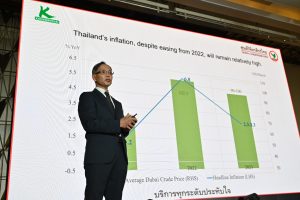
สรุป 10 กลยุทธ์การลงทุนโดย Lombard Odier
1. ลงทุนในสินทรัพย์ที่มีคุณภาพ หมายรวมถึงสินทรัพย์ที่มีสภาพคล่องสูงด้วย ซึ่งถือว่าเป็นสิ่งสำคัญโดยเฉพาะในช่วงตลาดผันผวน เพื่อเพิ่มความคล่องตัวในการปรับพอร์ตการลงทุนให้เข้ากับสถานการณ์
2. หุ้นกู้ที่มีอันดับความน่าเชื่อถือสูง (Investment Grade) มากกว่าหุ้นกู้ที่มีอันดับความน่าเชื่อถือต่ำ (High Yield) จากการที่ส่วนต่างอัตราผลตอบแทนของหุ้นกู้เอกชนกำลังจะปรับขึ้น
3. หุ้นที่มีราคาถูก (Value) และหุ้นคุณภาพดี (Quality)
4. สร้างพอร์ตที่ได้ผลตอบแทนในช่วงตลาดขาขึ้น ขณะที่ป้องกันความเสี่ยงในช่วงตลาดขาลงด้วย
5. ลดสัดส่วนของทองคำในพอร์ตการลงทุนลง อย่างไรก็ดี อาจมีการเปลี่ยนมุมมองในอนาคต
6. ขายสินทรัพย์โภคภัณฑ์ออกทั้งหมด สอดคล้องกับมุมมองของ Lombard Odier ว่าเศรษฐกิจจะถดถอยในปีหน้า
7. กระจายความเสี่ยงด้วยการลงทุนในสินทรัพย์ทางเลือก
8. ดอลลาร์สหรัฐฯ จะแข็งค่าต่อ แตะจุดสูงสุดในปีหน้า
9. ความผันผวนในตลาดจะยังคงสูง พอร์ตต้องมีความคล่องตัว
10. ให้ความสำคัญกับการลงทุนเพื่อความยั่งยืน
นายจิรวัฒน์ กล่าวในตอนท้ายว่า ธนาคารยังคงแนะนำกระจายการลงทุนในหลายๆ สินทรัพย์ผ่านกองทุนผสมเพื่อลดความเสี่ยงโดยรวมของพอร์ตลง โดยกองทุนผสมอย่าง K-ALLROAD Series ที่ได้เปิดตัวไปตั้งแต่ช่วงปลายปีที่ผ่านมา ซึ่งได้รับกระแสตอบรับที่ดีจากลูกค้า ด้วยสภาพตลาดการลงทุนในปัจจุบัน ธนาคารยังแนะนำให้ลูกค้ากระจายการลงทุนไปในสินทรัพย์ทางเลือกอื่นๆ เช่น กองทุนหุ้นนอกตลาด (Private Equity Fund) ซึ่งกองทุนที่ธนาคารแนะนำสามารถสร้างผลตอบแทนตั้งแต่จัดตั้งกองทุนที่ดีให้กับพอร์ตลูกค้าได้สูงถึง 47.83%* และ 25.67%* นอกจากนี้ ธนาคารยังได้แนะนำกองทุนด้านความยั่งยืน อย่าง K-CLIMATE โดยผลการดำเนินงานตั้งแต่จัดตั้งกองทุน Master funds ให้ผลตอบแทนที่ +16.15% ต่อปี**
ในปี 2566 ธนาคารยังมีแผนที่จะแนะนำผลิตภัณฑ์ทางเลือกการลงทุนอื่นอย่างต่อเนื่อง อาทิ กองทุนรวมตราสารหนี้นอกตลาด กองทุนรวมหุ้นนอกตลาด และกองทุนอสังหาริมทรัพย์นอกตลาด เพื่อกระจายความเสี่ยงและเพื่อสร้างผลตอบแทนที่น่าพึงพอใจให้กับพอร์ตการลงทุนของลูกค้าได้ในปีหน้านี้
สำหรับผู้ที่สนใจรับชมงานสัมมนา KBank Private Banking 2023 Economic and Investment Outlook ในหัวข้อ What’s Next Heading into 2023 สามารถคลิกรับชมได้ที่KBank Private Banking Youtube Channel https://www.youtube.com/c/KBankPrivateBanking
หมายเหตุ: ตำแหน่งผู้บริหารเขียนทับศัพท์ภาษาไทย
นายจิรวัฒน์ สุภรณ์ไพบูลย์ เอ็กซ์เซกคูทีฟ แชร์แมน ไพรเวท แบงกิ้ง กรุ๊ป ธนาคารกสิกรไทย
ดร.เชาว์ เก่งชน เอ็กซ์เซกคูทีฟ แชร์แมน ศูนย์วิจัยกสิกรไทย
* ผลตอบแทนตั้งแต่จัดตั้งกองทุนจนถึงปัจจุบัน (ข้อมูล ณ วันที่ 30 กันยายน 2565)
** ข้อมูล ณ วันที่ 26 ตุลาคม 2565
KBank Private Banking and Lombard Odier expect the global economy to enter a recession in 2023, while KResearch views that the Thai economy will feel the pinch, especially through exports; investors are advised to diversify into private assets and focus more on sustainable investments
KBank Private Banking KPB) and its strategic ally Lombard Odier, a world-class Swiss private bank, together with KResearch, forecast that the global economy will face a recession in 2023 due to the Federal Reserve’s tightening monetary policy, China’s zero-COVID policy and tentative reopening, as well as Europe’s energy crisis. KResearch views that the Thai economy will inevitably bear the brunt of the global economic recession. Investors are thus recommended to invest in quality assets with high liquidity, focusing on diversification, especially via private assets, and focus more on sustainable investments.
Mr. Jirawat Supornpaibul, Executive Chairman, Private Banking Group of KASIKORNBANK, noted, “Throughout 2022, the investment market has been anxious about the US’s runaway inflation, which prompted the Federal Reserve (Fed) to opt for aggressive interest rate hikes. Meanwhile, the protracted Russia-Ukraine war – which has no end in sight – has led to elevated energy prices in Europe, resulting in soaring inflation. Even though China’s economy has yet to slide into a recession, its economic growth has still fallen short of the target despite the Chinese authorities’ gradual reopening policy and implementation of fiscal policy to stimulate the economy. As a leading investment and wealth management advisory service provider, KPB has recommended that investors diversify their investment into private assets, including private equity, private debt and private real estate, so as to minimize their portfolio volatility. Investors are also advised to reduce their holding of equity funds while increasing their cash holding to around 5-15 percent of their portfolio to cushion against the impact of market volatility. They should adopt a wait-and-see attitude until the dust has settled.”
Dr. Charl Kengchon, Executive Chairman of KASIKORN RESEARCH CENTER, offered an interesting viewpoint that the global economic recession will inevitably affect the Thai economy, particularly the export sector that will have to encounter falling growth over the next 12 months. Regarding GDP growth, it will mainly rely upon recovery of the tourism sector, which is expected to continue to sustain overall economic growth. However, challenges will persist in terms of high household debt and weak global economic growth through 2023. As a result, economic uncertainties will likely increase in 2024 and upcoming years.
Summary of three key viewpoints of Lombard Odier towards the global economy
Firstly – the Fed’s interest rate hikes to curb inflation in the US. The Fed’s important goal is to bring US inflation down to an acceptable level. With such interest rate increases, it is highly possible that the US economy will enter a recession. According to Lombard Odier’s assessment, the Fed will raise the interest rate by 0.75 percent in November, 0.50 percent in December and eventually 0.25 percent next February, which will push the rate to its highest level of this cycle at 4.75 percent. Concerning inflation, Lombard Odier believes it will gradually go down to an acceptable level within the middle of next year. Given the problem of delays in supply chains, and improving situations of commodity prices and transport fees, inflation measured by goods prices will decrease. Additionally, the property market will face rising interest rates of home loans and higher home prices, which will lead to slowing demand for home purchases. There are two additional variables to be monitored, including: (1) Inflation measured by service prices remains at high levels; and (2) Unemployment has fallen somewhat, but is still high. Unemployment should be higher in order for inflation to drop further. However, this year’s fundamentals, including the strengths of the banking, household and private sectors, are different from the 2008 crisis, which confirms Lombard Odier’s opinion that a financial crisis can be avoided, although an economic recession will occur.
Secondly, following China’s 20th National Congress of the Communist Party held recently, Lombard Odier believes China will continue to strive for economic growth after President Xi Jinping has further consolidated his power. Lombard Odier is of the view that China has two ways to promote its economic growth: (1) Opening up the country – It is likely that Beijing will gradually open up the country in 2023; and (2) Implementation of economic stimulus measures via fiscal policy. Aside from fiscal policy, Beijing still has an accommodative monetary policy in place. With benign inflation, China is the only country where interest rates are on a downward trend. This is aimed at sustaining the property sector by accelerating loan extension, which should be sufficient for China to avoid a hard landing and support economic growth over subsequent quarters.
Thirdly, the energy crisis in Europe. Inflation in Europe has soared amid skyrocketing energy prices. However, energy prices there have already begun to decline, with many factors affecting their volatility, including warmer-than-expected weather in Europe recently. As a result, the household sector has yet to use much energy for heating. Additionally, various European governments are making efforts to store energy reserves and diversify energy sources such as expanding nuclear and coal-fired power plants. Most importantly, they have increasingly switched to alternative energy. Having analyzed the overall European policies, Lombard Odier views that although Europe may not be able to avoid a recession, it may at least avoid the worst possible scenario.
Summary of 10 Investment Strategies by Lombard Odier
1. Invest in quality assets, including highly liquid assets. This is imperative, especially during volatile market conditions, in order to bolster liquidity for the alignment of investment portfolios with the prevailing conditions.
2. Focus on investment grade debentures rather than high-yield debentures, as the credit spread of debentures is set to increase.
3. Focus on value and quality stocks.
4. Manage your portfolio to earn returns during upward trends in the markets, while hedging against risks during downward trends.
5. Minimize the proportion of gold investment in the portfolio. However, its investment prospects may change in the future.
6. Sell off commodity assets, in alignment with Lombard Odier’s outlook on an economic recession next year.
7. Diversify risks by investing in alternative assets.
8. The US Dollar will appreciate further, possibly reaching its highest level next year.
9. Adjust with a dynamic portfolio amid market volatility that will remain high.
10. Focus on sustainable investments.
Mr. Jirawat Supornpaibul, noted in closing, “KBank still recommends mixed funds for investment diversification across varied assets to reduce overall risk. K-ALLROAD Series funds, launched late last year, have received a good response from investors as the funds are suited to current market conditions. Plus, we advise customers to diversify their investments in other alternative assets, including our private equity funds that have generated returns of up to 47.83 percent* and 25.67 percent* since their establishment. Additionally, we introduced a sustainability-themed K-CLIMATE fund that has offered a return of +16.15 percent per annum** since the establishment of its master fund.
In 2023, KBank plans to continually introduce additional alternative investment products, such as private fixed income funds, private equity funds and private real estate funds, to diversify risks and generate satisfactory returns to customers’ investment portfolios.
Interested persons can view a KBank Private Banking 2023 Economic and Investment Outlook seminar titled, “What’s Next Heading into 2023”, at the KBank Private Banking YouTube Channel: https://www.youtube.com/c/KBankPrivateBanking







